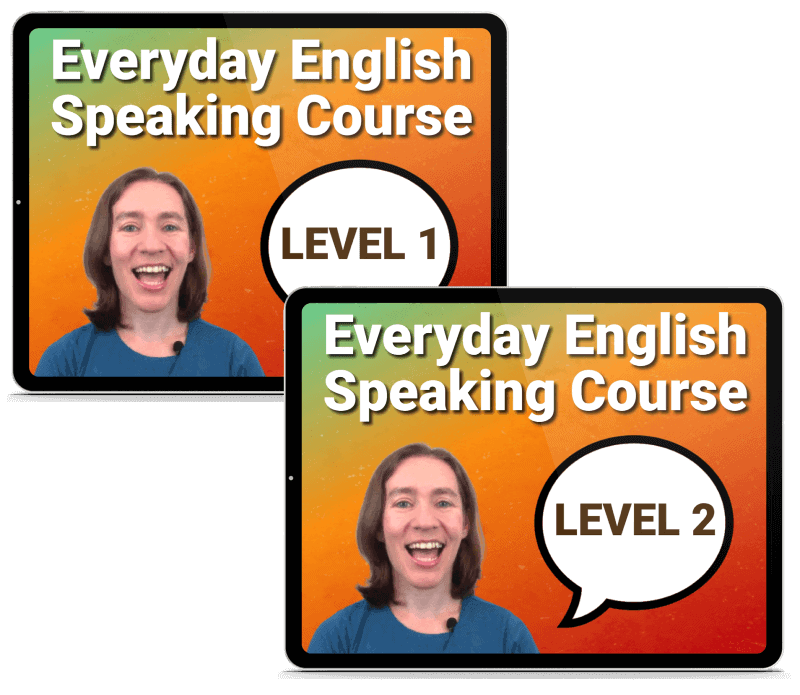
English speaking difficulty #1 – Listening
Remember that when you’re having an English conversation, you’re only speaking about 50% the time – the other 50% is spent listening to the other person speak. If you don’t understand what the other person is saying, it’s difficult to reply.
Here are two ways you can improve your English listening skills:
First, practice listening to English EVERY DAY. All you need is 10-15 minutes per day to develop your listening skills. You can get free English podcasts on websites like ESLpod.com and listen to them while driving, taking public transportation, exercising, or doing housework.
It’s especially important to listen to English conversations (not just lectures). Also, make sure you sometimes listen to audio made for students learning English, and sometimes audio made for native English speakers.
Next, memorize these English phrases that you can use in conversation when you don’t understand something:
- I beg your pardon?
- I’m sorry, I didn’t understand that.
- Could you repeat that, please?
- Could you say that again, please?
English Speaking Difficulty #2 – Vocabulary
Sometimes when you’re speaking English, you have a sentence in mind, but you’re missing two or three important vocabulary words – and then it becomes difficult to say what you’re thinking.
The solution? Learn more English vocabulary words! But there’s a good way and a not-so-good way to learn new words. The not-so-good way is to read lists of English words and definitions, and try to memorize them.
A good way is to learn words in “families.” For example, imagine you’re in an airport. Do you know the English words for everything you see? (luggage, check-in desk, travel agency, flight attendant, boarding pass) If not, look for the words you don’t know in a dictionary.
Now think about what kind of English conversations you might have in an airport. How would you ask for help if you can’t find the gate? What would you say if you missed your flight? How about going through immigration? (See this lesson to learn travel English in the airport!)
Create conversations in English, and write them down in your vocabulary notebook. This will help you learn useful English words that are all related to each other, so the next time you’re in an airport, you won’t have problems with missing English vocabulary.
English Speaking Difficulty #3 – Pronunciation
English words can be difficult to pronounce – and when speaking English, you have to consider not only the pronunciation of the individual words, but also the connection between the words in the sentence. There’s also the “rhythm” and intonation of the sentence to consider – and sometimes your mouth gets confused!
There are two things that can help you improve your English pronunciation. One way is to take a pronunciation course. Another way to improve your pronunciation is to keep practicing your English listening skills. The more you listen to English, the more your pronunciation will naturally get closer and closer to a native English speaker’s pronunciation.
A good way to practice is to get an audio sample with transcript. Listen to one or two sentences (while reading the transcript), then pause the audio and try to repeat the sentences exactly as the native English speaker said them. Practicing English pronunciation like this will help you improve your accent very fast.
English Speaking Difficulty #4 – Confidence
If you feel nervous and are afraid of making a mistake while speaking English, then your problem is confidence. Good news – you don’t need to speak fluent English to have confidence! You can increase your confidence right now with these three tips:
First, don’t worry too much about English grammar! Just do your best to communicate, and you’ll often be successful even if you do make a small grammar mistake. Also, remember that spoken English grammar is often more “flexible” than written English grammar.
Second, keep a positive attitude. Think of yourself as an English speaker (because you are!) and focus on celebrating what you know, not being frustrated about what you don’t know.
Third, practice speaking English as much as possible in low-pressure situations. Here are two examples of low-pressure situations: Talk to yourself! It might feel ridiculous, but it really helps!
Talk to your English teacher and your friends in English class. If you make a mistake, they can correct you. You can also join a “conversation exchange” to find a native English speaker who wants to learn your native language – then you can talk to each other to practice speaking skills in both languages.
It’s extremely important to practice speaking English in low-pressure situations as much as possible to build your confidence so that you will be comfortable speaking English in a more “high-pressure” situation (like a teleconference, presentation, or job interview).
If you want to speak English fluently, make sure to work on these four areas – improve your listening skills, improve your English vocabulary, practice pronunciation, and increase your confidence. I hope these tips help you learn English speaking!










